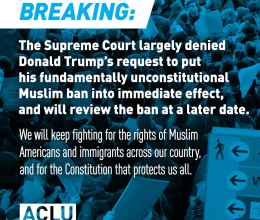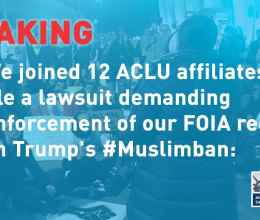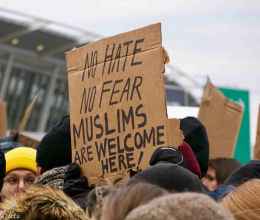You may have been hearing or seeing news accounts about a San Diego elementary school, Carver Elementary in Oak Park, which allows time during a recess period for approximately 100 Muslim Somali students to offer their noontime prayers, per the traditions of Islam. You may have also heard an implied condemnation of the ACLU for not leaping into court to enjoin the school from promoting prayer in school.
This point of view misunderstands the ACLU’s long history of working in the courts and in public education to protect the rights of individuals to exercise their religion freely. The ACLU does have a number of concerns about this particular case, and is carefully monitoring the school’s modifications to the program. Our statement, expressing our concerns and articulating the competing constitutional issues, is below.
The following statement can be attributed to Kevin Keenan, Executive Director of the ACLU of San Diego and Imperial Counties:
The situation at Carver Elementary School in San Diego raises serious concerns—and not just about prayer in school. But, some groups are actively engaged in exploiting the concerns about the Carver program for political and financial gain.
Parents—not governments and not public schools—should decide what religious training children receive. Individuals—not the government—should choose how they exercise the callings of their conscience on matters of belief. That is what our Constitution requires, and it is what is right and best for both religion and government in this country.
In public schools, this means there can be no mandatory prayer or other religious activity sponsored by the school. Public school students can pray on their own time, during recess, or in other ways that are not disruptive to the school and burdensome to other students. Schools may allow children to engage in genuinely voluntary prayer when they are in a non-coercive setting and when they do not pressure students to join. Students can have Bible study groups on campus and be excused for holidays such as Yom Kippur and Good Friday. Of course, schools cannot favor or discriminate—either for or against a particular religion or between religious and non-religious meetings, excused absences, or break activities.
At Culver, some Muslim school children sought to pray at school in conformity with what they and their parents believe to be the requirements of their religion. Under most interpretations of Islam, the faithful are instructed—as a general rule—to pray five times each day at certain identified times (but which fluctuate during the calendar year). Performing these prayers are widely—if not universally—recognized as one of the five essential “pillars” of Islam. One of these prayer times will always fall during the school day at Carver when students are required by law to be at school. But some Muslims’ faith allows their prayers to be combined at a later time if necessary.
According to reports in the San Diego Union-Tribune, Carver absorbed a failing Arabic language charter school in September 2006. The school district has charter and magnet schools with language immersion programs in Mandarin, German, and Spanish, and the principal of Carver envisions a similar program in Arabic. Carver found out only days before school opened that the merger would happen, and it is “still working to integrate the Muslim students with the rest of the campus.”
If there is a plan for integration, we would like to know the details. It should be quick, and it should end any segregation by sex and—if any exists (the reports so far are unclear)—any segregation by race, national origin, and religion. The school’s handling of students who want to pray—whether to Jhwh, Allah, Jesus Christ, or otherwise—should meet the constitutional standards described above. The school should confirm with these students and their parents that their faith requires a school-day prayer without an applicable exception.
Since learning of the Carver program, the ACLU has been monitoring and investigating. We made public records requests to get a better handle on the facts, spoke to the school district’s attorney, and have communicated our position to the school district. There are questions that remain to be answered. We will continue to monitor the situation to insure that the rights of all are protected and that competing rights are reconciled appropriately.
As to certain right-wing groups who are excitedly writing their direct mail pieces, be aware of the deep ironies and bias in some of their arguments.
The umbrage at single-sex classes (“segregating classes for girls, a la Taliban”) is novel. In 2006, it was the Bush Administration that radically altered Title IX regulations to allow for sex segregated classes for almost any reason. The ACLU believes sex segregation is wrong and students should be given the opportunity to interact, compete and collaborate with students of different races, sexes and religions so they can learn from each other and be better prepared for citizenship and the real world. But, you will not find a consistent, principled stand on this issue from the critics of the Carver program.
Or, consider the accusations that adding Arabic (“the language of the Quran,” according to these narrow-minded ideologues) to a public school curriculum is somehow traitorous (part of the “stealth jihad under way in our public schools”). In fact, the Bush Administration and others are promoting Arabic instruction and understanding of the Middle East and Islam in public schools for the sake of America’s diplomatic relations and national security.
Most unfortunately, some are using inflammatory rhetoric to suggest that the Carver program is about preference for Muslims over Christians, rather than the challenge of reconciling an individual’s right to freedom of conscience and religion with the bar on school sponsorship of religion and the educational needs of the school. In fact, all religions and beliefs face different applications of this same, sometimes challenging tension between two important rights that make America special and wonderful.
The ACLU takes both the freedom of religion and the separation of church and state very seriously and protects each. For a list of the cases in which the ACLU has defended the freedom of religion of Christians and other people of faith—the list these extremist groups do not want you to know about, because it might help you to understand the ACLU’s commitment to fundamental American values—click here.
San Diego Unified School District Policies
ACLU Statement on Carver Elementary School's School Prayer Policy
Related Issues
Related content
ACLU Comment on Supreme Court Action on Trump Muslim Ban
December 4, 2017ACLU Comment on Trump Administration’s Possible New Travel Ban...
September 22, 2017
Supreme Court to Hear Trump Muslim Ban Challenge
June 26, 2017Federal Appeals Court Rules Trump Muslim Ban Unconstitutional
May 25, 2017
ACLU of San Diego & Imperial Counties Files Lawsuit Demanding...
April 12, 2017ACLU Applauds California Bills to Reject Muslim Registry & Protect...
April 3, 2017In California, We the People Can Protect Our Values and Each Other
March 16, 2017
Why the Only Way to Fix the Muslim Ban Is Not to Have a Muslim Ban
March 6, 2017
